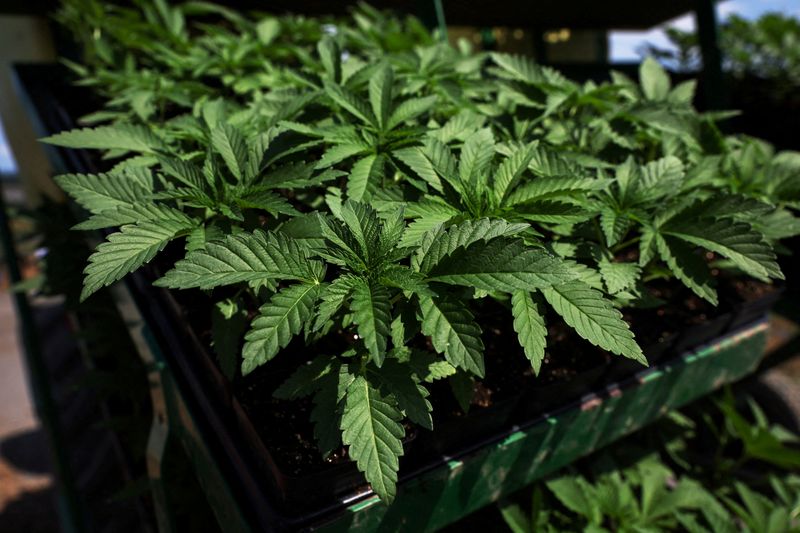By Mrinalika Roy
(Reuters) - The global banking turmoil threatens to squeeze U.S. cannabis companies already struggling with meager funding sources by drying up support from regional lenders and tightening fundraising from alternative avenues.
Most U.S. banks do not service cannabis companies as marijuana remains federally illegal despite several states legalizing its medicinal and recreational use and is a Schedule 1 drug.
Only about 10% of all U.S. banks and about 5% of all credit unions provide cannabis banking, as per analysts' estimates.
"What this crisis means is probably the duration of the capital tightness in our space (will continue) because we're seeing risk-off mentality," said Morgan Paxhia, co-founder of cannabis hedge fund Poseidon Investment Management.
"We're expecting banks to become more restrictive with lending and that's going to have implications."
The collapse this month of two U.S. mid-sized lenders -- the Silicon Valley Bank and Signature Bank (NASDAQ:SBNY) -- and the Swiss government-brokered deal for UBS to buy Credit Suisse have sparked fears of a contagion and shredded investor confidence.
"Given they already have slim pickings when it comes to raising capital, nervous investors won't help the situation," said Rachel Gillette, partner and leader of Holland & Hart's cannabis practice.
Smaller banks, regional lenders and credit unions that typically extend credit to the cannabis sector have been flagged by analysts as facing higher risk from the current turbulence.
U.S. cannabis borrowers could also see their already higher interest rates go up further due to the crisis.
Average interest rate in the cannabis sector can be as high as 20%, according to True Trading Group, an online community of traders and entrepreneurs. That compares with the 5% to 5.7% average rate for business loans from traditional banks, as per Bankrate, an online publisher of finance content.
WEEDED OUT
Expensive loans may not be the only challenge for the sector. Chances of weed companies securing new capital have now deteriorated, at least four fund managers told Reuters.
"It's incredibly hard raising capital in cannabis, but we now think (opportunities to secure new capital) are even lower as investors are cautious," said Paxhia.
"Primary investors in cannabis are high net worth individuals not institutional capital, and those pools of capital are going into a risk-off mode."
Investors had flocked to the sector encouraged by a boom in demand during the pandemic as well as hopes of passage of the Secure and Fair Enforcement Banking Act (SAFE), which protects lenders serving legitimate cannabis-related businesses.
However, demand has since eased and the SAFE Act is stuck in Senate.
ETF flows into the sector fell to about $404 million last year, down from about $2.3 billion in 2021, according to ETF data provider TrackInsight.
Investors pulled $34.13 million out of U.S. cannabis exchange-traded funds since the start of 2023, compared to inflows of $116 million in the first quarter a year earlier, according to Refinitiv data.
Graphic-Investor interest in cannabis https://www.reuters.com/graphics/GLOBAL-BANKS/CANNABIS/egvbyjaxdpq/chart.png
"It (banking crisis) certainly has shot away a lot of investors who were just beginning to think about deploying more capital into the space again," Vince Ning, CEO and co-founder of Nabis, the largest cannabis wholesale distributor in California.
"Should the sector deteriorate further, you could see more predatory financings for smaller operators with no choice," said Adam Heimann, co-founder and CEO of True Trading Group.
REFORM PAUSE
Some investors also fear that the crisis will add uncertainty around the passage of the SAFE Act. The U.S. House of Representatives passed it in 2021, but the Senate is yet to approve the bill.

On Thursday, Senate Banking Chairman Sherrod Brown said hearings on SAFE Act has been postponed to focus on the bank crisis. "This crisis, once again, de-prioritizes cannabis reform in Washington DC," said Paxhia.
U.S. companies including Curaleaf Holdings (OTC:CURLF) Inc, Green Thumb Industries (OTC:GTBIF), Trulieve Cannabis (OTC:TCNNF) Corp, and Terrascend Corp either declined to comment or did not respond to requests for comment.